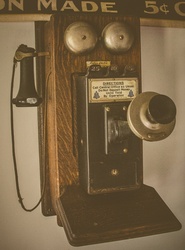The "Luddite" Complex
Yesterday Dr. Andy Farnell asserted that: "Devious or confused thinkers often level the accusation of "Luddite" against anyone who even mentions autonomy and negative freedoms. For them, platform normativity is a stick with which to beat others, as a cover for their own ambition, insecurity or identification. They misuse words like "compatibility" and "interoperability" to mean domination of their own standards, rather than real plurality."
Let's think for a moment what this means, in particular the "Luddite" analogy or the "being backwards" metaphor. As if some people insist on using stones and twigs to start a fire in the age of lighters and electric hobs. Half a day ago we took a phone back from repair. It's not an old phone, it's just over 12 years old. Yesterday we also bought batteries for an alarm clock from the mid-90s. I've not actually used it for over two decades (it was a gift from my grandmother), but it still works it has plenty of functionality, including calculator. It does not require recharging every day; a pair or AAA batteries can drive it for nearly a year and with rechargeable batteries it'll cost just pennies to run for a decade or so.
Old is not bad. Old is just old. We don't call a person who is 20 "old" or assert the person is obsolete. A person aged 20 is older than 10, for instance, but can likely do both mental and physical jobs a lot better. Age isn't a measure of "badness". In some cases (wine for instance), age is a measure of value. Devices that last very long (my stereo system is about 30) are likely built using robust components. They are perhaps more likely to last another decade... and another decade.
In a sense, we ought to discard or mostly reject this notion that whatever is newer (even in tech) is necessarily better. Yesterday I used my Palm PDA, which is over 20 (I bought it in 2004) to look up an account number. It did that just fine, it didn't ask me to install "the latest updates" or change SIM or whatever.
Sometimes simplest is best and sometimes "modern" is designed not with the buyers' interest in mind. Modern gadgets are often just plasticware with nice veneer, but they're not really expensive (nor are they made to last), so they're not really status symbols; they do not symbolise wealth or class. █

